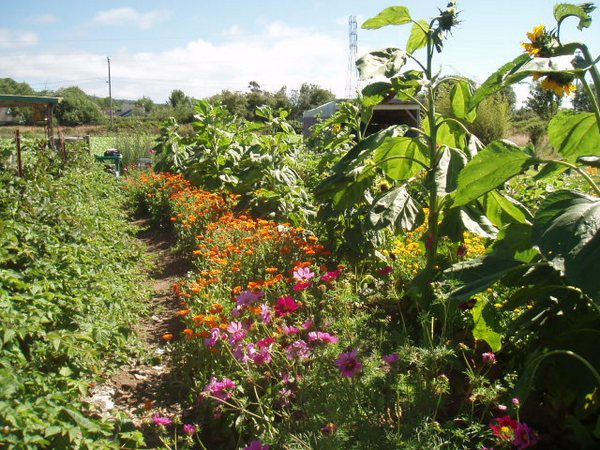The use of biotechnology and organic farming in agriculture is a revolutionary step. Organic farming was first introduced in 2001-02 in one village in each development block of each district in Madhya Pradesh, India.
- Objectives of organic farming
- Organic farming has two objectives.
- make the system sustainable
Making organic farming environmentally sensitive
In order to achieve both these goals, there is a need to adhere to standards. As you know that there is a possibility of the use of chemical fertilizers in Indian agriculture by adopting pure organic farming. The adoption of organic farming requires the strengthening of integrated nutritional management and biological control methods so as to reduce the need for chemicals.
Principles of organic farming
The success of organic farming in agriculture is based on three basic principles:
1. Interdependence
The most important of these is interdependence, in organic farming, a farm is viewed as an ecosystem and it is assumed that a change made on one farm should have an effect on another. For example, the presence of more nitrogen in the soil will result in faster growth of weeds. To overcome this problem, the farmer will try to grow a crop that absorbs a high amount of nitrogen from the soil and thus balances the nutrients in the soil.
2. Diversity
The second principle of organic farming is that of diversity. Organic farming is done to maintain the balance of nutrients in the soil. To maintain a balance between farmers’ crops and livestock, farmers should raise farms as well as livestock. Diversity in crops and livestock also brings diversity and flexibility to farmers’ incomes. On the other hand, it prevents any pest or weed, or disease from becoming a problem in the ecosystem.
3. Recycling
The third principle of organic farming is recycling, that is, reusing. The reuse of plant and animal residues in it helps in retaining the nutrients of the farms.
Need for organic farming
Agricultural production in India, especially the production of foodstuffs, has grown rapidly over the past several decades. This achievement has been achieved through improved varieties of seeds, chemical fertilizers, and mechanization in agriculture. The use of chemical fertilizers for a long time reduces the productivity of the soil and on the other hand, increases environmental pollution. These problems have led to attempts to find alternative methods in farming. In this direction, nowadays attention is being paid to organic farming from modern farming. Organic farming is based on the coordinated relationship between soil, minerals, water, plants, insects, animals, and mankind. It provides protection to the soil while providing protection to the environment.
Biological management emphasizes human resources, knowledge, and the use of natural resources found around. Organic farming is also helpful in increasing food security and generating additional income. Organic farming plays a positive role in meeting the objective of sustainable agricultural development and rural development and brings about changes in the socio-economic conditions of the farmers along with increasing soil fertility. The demand for organic food is increasing continuously at the rate of 20-25 percent in developed and developing countries.
130 countries worldwide produce certified organic substances on a commercial scale. The farmer cannot prosper only by growing traditional crops, it is also necessary to change the cropping pattern according to the changing demand and prices. The demand for foods grown using natural methods and organic fertilizers is increasing rapidly in Europe, America, and Japan. According to this increasing demand, it is necessary to motivate the farmers to take advantage of the production by producing.
Effects of Organic Farming
1. From the farmer’s point of view –
- The fertility of the soil increases. The productivity of crops increases and the farmer earns more income.
- Reducing the dependence on chemical fertilizers leads to lower costs.
- It preserves the ancient and indigenous knowledge of cultivating farmers.
- The increase in the demand for organic material in the international market increases the income of the farmers.
2. From the point of view of soil –
- It provides nutrients to the soil slowly to the plants and thus the effect of this fertilizer lasts for many years.
- It increases the essential elements like nitrogen, potash, phosphorus, and calcium in the soil and thus helps in improving the physical properties.
- The use of organic manure retains the moisture in the soil for a long time.
- Some nitrogen-rich beneficial substances are found in organic fertilizers, which help in the rapid growth of plants.
- It helps in soil conservation and water conservation.
3. Environmentally –
- Waste is used to make Manu
- Where the quality of our resources decreases with chemical agriculture, our resources are conserved by organic agriculture.
- Agricultural biodiversity is conserved.
Organic Farming Problems / Constraints
Shortage of compost in India, the nutrient gap in organic material, complexity in collection and processing from waste, lack of package to incorporate organic farming practices with the cost-benefit ratio of different crops, and farmers without financial support It is difficult to adopt. Apart from this, there are many obstacles to the progress of organic farming:-
1. Lack of awareness – Farmers also lack knowledge of using modern techniques for compost preparation. Most of the farmers do this by digging a pit and filling it with a small amount of waste. Often the pit gets filled with rain water and as a result, the upper part of the waste is not fully composted and the lower part becomes like a hard pot. There is a need to provide proper training to the farmers about the preparation of organic compost.
2. Marketing problem – It is found that before starting the cultivation of organic crops, they are marketable and ensure profit in comparison to conventional products. Evidence has been found that farmers of organic wheat in Rajasthan got lower prices than traditional wheat farmers. The cost of marketing both types of products was also similar and buyers of wheat were not ready to pay higher prices for the organic variety.
3. High cost – Small and marginal farmers of India have been doing a type of organic farming as a traditional farming system. They use local or their own resources to regenerate the farms in such a way that the eco-friendly environment is maintained. Organic fertilizers cost more than chemical fertilizers. Groundnut cakes, neem seeds and their cake cakes, organic compost, manure, cow dung, and other manures have been used as organic manures. Due to the increase in their prices, they are becoming out of reach of small farmers.
4. Lack of financial assistance – No assistance is given by the Central and State Governments for the marketing of organic products. Even there is a complete lack of financial process to promote organic farming.
5. Inability to meet export demand – There is a great demand for organic products in developing countries like the USA, the EU, and Japan. The American consumer is ready to pay 60 to 100 percent remunerative price for organic products. Market surveys conducted by the International Trade Center (ITC) in the year 2000 indicated that the demand for organic products in many parts of the world markets has increased, while the supply of organic products has not been able to. The export of organic materials in India is found to be lacking in incentives.












